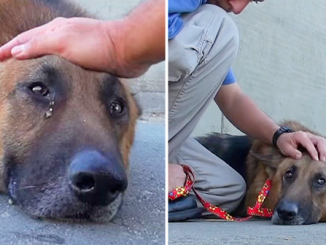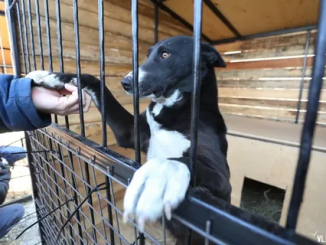
In 2007, a dark chapter in the world of animal cruelty came to light when authorities rescued 51 Pit Bulls from the Virginia home of Atlanta Falcons quarterback Michael Vick. These innocent animals had endured unimaginable abuse, subjected to beatings, electrocutions, hangings, drownings, and forced dogfights.
Out of this horrific ordeal, 48 resilient Pit Bulls emerged as survivors, thanks to the dedication of several rescue organizations and their forever families. One of these survivors, Frodo, recently passed away at the age of 15 on December 18th, 2021. Frodo’s journey serves as a testament to resilience, second chances, and the unwavering commitment of those who fight for justice and rehabilitation.

Frodo’s life was a stark contrast to the year he spent in hell at Michael Vick’s compound. Once rescued, he was embraced by a loving family and pampered like a prince for the next 14 years. His passing left a void in the hearts of those who knew and cared for him, particularly BAD RAP, an Oakland-based nonprofit animal protection group that played a pivotal role in advocating for and rehabilitating the Vick dogs.

In a touching Facebook post, BAD RAP bid farewell to Frodo: “To Frodo – We all adored him. He was one of the most valiant survivors we’d ever met.” His passing was peaceful, surrounded by the love of his family, who ensured his final moments were filled with comfort and care.

Frodo’s journey wasn’t just a personal triumph; it became a symbol of hope and resilience for Pit Bulls and dogs with difficult pasts everywhere. BAD RAP, with its extensive experience in working with dogs rescued from dogfighting rings, always believed in the potential for these dogs to be rehabilitated and reintegrated into loving homes.
Frodo’s story dispelled the negative stereotypes associated with Pit Bulls and underscored the transformative power of patience and kindness in a dog’s life. He exemplified the importance of early socialization for dogs rescued from cruelty incidents, showing that with the right environment and loving care, even the most timid and scarred animals can thrive.

Kim Ramirez, Frodo’s adoptive mother, shared insights into his journey, explaining how mechanical sounds and sudden movements used to terrify him. She described the challenges of helping Frodo overcome his past trauma, such as his fear of ceiling fans and microwave popcorn, which likely reminded him of the traumatic events he had witnessed.

Throughout his life, Frodo enjoyed the devoted care of the Ramirez family, who accommodated his needs, including transporting him in a stroller when his legs began to fail. His story was a testament to the healing power of love and the resilience of animals.

Frodo’s passing is a reminder of the enduring legacy of the 48 survivors of Michael Vick’s dogfighting ring. These brave dogs were given the opportunities they deserved, and despite their challenging backgrounds, they lived happy lives, proving that remarkable transformations are possible with compassion and commitment.
While Michael Vick’s actions were reprehensible, the high-profile case did raise awareness about dogfighting and its devastating consequences. It also shifted public perception of Pit Bulls, showcasing their potential for rehabilitation and adoption. Frodo and his fellow survivors are living proof that even in the darkest of circumstances, there is hope for a brighter future.

As we bid farewell to Frodo, we honor his memory and the countless animals who have found their second chance at life through the dedication of animal rights activists and the kindness of loving families. Frodo’s story will continue to inspire us to fight for justice, compassion, and a world where every animal can thrive.
“Happy 17th Birthday to Beannie: Wishing Her the Best on Her Special Day!”

Warm greetings and well wishes on Beannie’s 17th birthday! 🎂🎉 May her day be brimming with joy, happiness, and unforgettable memories. As she embarks on this new chapter in life, may it be a time of personal growth, success, and the realization of all her aspirations. Let us raise a glass to a bright and promising future for Beannie. Happy Birthday, dear Beannie! ❤️



Leave a Reply